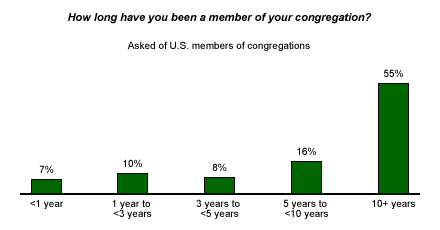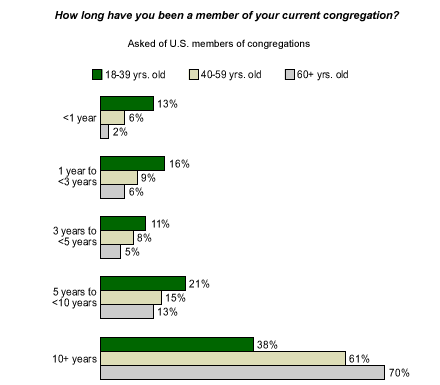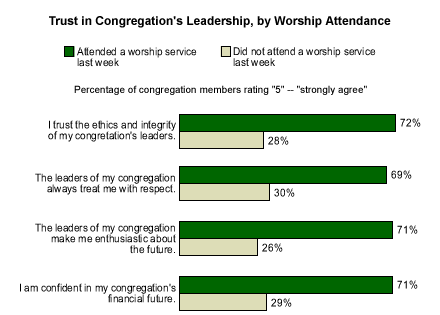Americans seem to have deep roots when it comes to their religious congregations. According to an October 2004 ���۴�ýPoll*, a majority (55%) of U.S. congregation members say they have been members of their current congregations for more than 10 years. It appears that once they find a faith community, most congregation members settle in and call that community home.
Naturally, age makes a difference in length of membership: 70% of members aged 60 and older have been with the same congregation for 10 years or more, compared with 61% of 40- to 59-year-old members and just 38% of those 18 to 39. Only 2% of those aged 60 and older, 6% of those aged 40 to 59, and 13% of 18- to 39-year-olds have been members for less than one year. The data indicate that stability is the norm for congregation membership, rather than the exception, across all age groups.


Leaders Stay, Too
Congregation leadership appears to have some stability, as well. Thirty-one percent of congregation members indicate their faith community's primary leader has been there 10 years or more; only 10% say their leader has been there less than one year. In addition, 40% of members indicate that their congregation has had only one leader for the duration of their membership.
Length of Membership and Attendance
So members and leaders alike tend to stay in their congregations for considerable periods of time -- but does this longevity make a difference in worship attendance? Our data suggest that it actually doesn't. The percentage of congregation members who say they've attended a service in the last week does not vary significantly between members who have been with their congregations for a long time or a short time. Nor does the length of tenure of a congregation's leader make a difference: Attendance patterns vary little among those who say their current leader has been there a long period of time or a short period of time, or among those who have had one or more than one primary leader.
The Difference Is Quality
A congregation leader's length of tenure may not make a difference in the level of member attendance, but the quality of the leader does. ���۴�ýuses member ratings on four survey items to help determine the quality of a congregation's leadership.
- The leadership of my congregation always treats me with
respect.
- The leadership of my congregation makes me enthusiastic about
the future.
- I trust the ethics and integrity of my congregation's
leaders.
- I am confident in my congregation's financial future.
Members who attend services weekly are more likely than those who don't attend services weekly to "strongly agree" with each of these statements (rating them "5" on a scale of 1 to 5).

Bottom Line
When it comes to religious leadership, it isn't the length of one's tenure, but rather the quality of one's leadership that makes a difference. There are voices in the religious world who claim that the longer a leader leads his or her faith community, the more effective the ministry. But if leaders treat their members with respect, make their members enthusiastic about the future, ensure their ethics and integrity are above reproach, and help their members feel confident about the financial future of the congregation, they will have an effective ministry -- no matter how long or short the stay.
*Results are based on telephone interviews with 1,000 adult members of a church, synagogue, or other religious faith community, aged 18 and older, and 500 nonmembers, conducted in October 2004. For results based on this sample, one can say with 95% confidence that the margin of sampling error is ±2.6 percentage points.